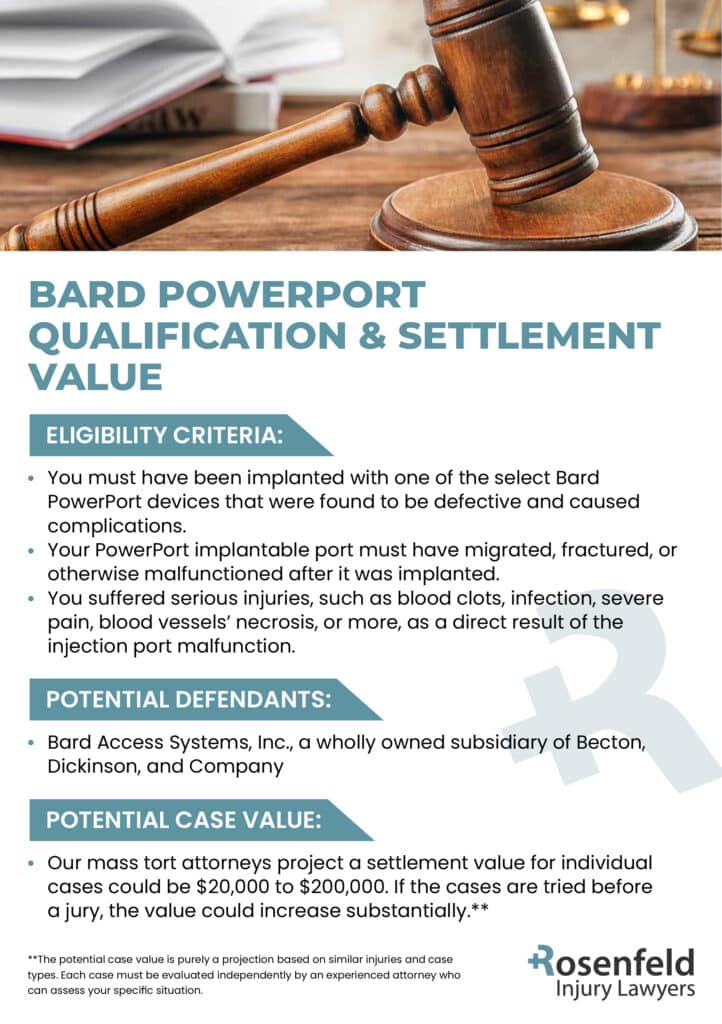There have been many reports about patients suffering from serious complications because of defective Bard PowerPort implantable catheters. Lawsuits filed across the country have now been consolidated under a multi-district litigation.
Below is an in-depth look at what these lawsuits are about, how you can file one if you’ve suffered because of a defective catheter, and how much you could potentially win in damages. If you or someone you know suffered medical complications because of the Bard PowerPort, call us at (888) 424-5757 and we can help you with your claim.

What Is the Bard PowerPort Implantable Port Lawsuit About?
The Bard PowerPort lawsuit is about a port catheter device used to deliver fluids, medications, and nutrients into the bloodstream. Many patients have filed lawsuits against the maker alleging that their device fractured or moved out of position. The device’s failure is claimed to cause infections that may lead to stroke, thrombosis, bloodstream infections, and even death.
What Is the Status of the Bard PowerPort Lawsuit?
The United States Judicial Panel on Multi-District Litigation (JPML) has allowed all Bard PowerPort lawsuits filed in any district court throughout the US to be consolidated into multi-district litigation before Judge Campbell in the district court of Arizona as the lawsuits share similar allegations and facts. [1]
A series of case management orders have since been issued by the judge to set the framework, calling for the discovery to be completed by January 31, 2025, and expert depositions by June 30, 2025. [2]
Is There a Class Action Lawsuit on Bard PowerPort Devices?
There isn’t a class action lawsuit on certain Bard PowerPort devices. The escalating number of federal lawsuits making similar claims of Bard Port design flaws that led to health complications have been organized into multi-district litigation by the Judicial Panel on Multi-District Litigation consolidated under a single judge and assigned case number 2:23-md-03081. [3]
The MDL is a way to streamline mass tort claims, significantly reducing the cost of litigation for plaintiffs and enabling the trial to proceed without major delays.

Bard PowerPort Lawsuit Updates
- November 22, 2023: Judge Campbell issues several Case Management Orders to set the procedure for the MDL and creation of a master complaint in the Bard PowerPort device lawsuit.
- November 16, 2023: Proposal for planning the bellwether trial, a process in which a few cases are selected to be tried first from a larger group of similar lawsuits, is submitted. 15 cases will be selected as Discovery Group 1 by December 17, 2024, with each party selecting five cases each and the remaining five being selected jointly. The creation of the master complaint is expected soon.
- October 2, 2023: Judge Campbell in the District of Arizona is assigned the Bard PowerPort catheters MDL lawsuit.
- August 08, 2023: The Judicial Panel on Multi-District Litigation rules that all Bard PowerPort claims filed in federal court will be consolidated in a new MDL under a single judge.
- June 12, 2023: Motion filed before the Judicial Panel on Multi-District Litigation to combine all Bard PowerPort lawsuits pending before federal courts into a new Bard PowerPort MDL.
You may be eligible to file a Bard PowerPort lawsuit and seek compensation if you or a loved one were implanted with a defective Bard PowerPort device by your doctor and later experienced an injury caused by the port catheter device.
Simply reviewing the existing Bard PowerPort lawsuit allegations as a benchmark for your eligibility isn’t enough. It’s best that you seek an opinion from a licensed attorney to ensure that you meet the eligibility criteria which include:
- Implanted With Defective Device: You must have been implanted with one of the select Bard PowerPort devices that were found to be defective and caused complications.
- Device Malfunctioned: Your PowerPort implantable port must have migrated, fractured, or otherwise malfunctioned after it was implanted.
- Injuries Caused: You suffered severe injuries such as blood clots, infection, severe pain, blood vessels’ necrosis, or more, as a direct result of the injection port malfunction.
Bard PowerPort Devices Named in Lawsuits
The following Bard PowerPort devices have been named in lawsuits for causing serious injuries due to catheter fracture or migration. If you or someone you know were implanted with one of these implantable port devices, you may be eligible for compensation.
- Slimport Implanted Port: Discrete design. Reduced incision. High performance and more durable. Biocompatible and lightweight.
- X-Port Implanted Port: Medium-Sized Port. Silicone-Filled Suture Holes. Tapered Port Design. Cath-Lock Radiopaque Ring.
- Implantable Ports With ChronoFlex Polyurethane Catheter: Compact size. Septum palpation bumps for thin tissue layers. Custom port securement. Silicone port body.
- Powerport Clearvue Slim Implantable Port: Minimal footprint for superior imaging in MRI and CT scans. Lightweight design. Power Injectable.
- Powerport Duo MRI Implanted Port With 9.5 Fr. Dual Lumen ChronoFlex Polyurethane Catheter: Dual-lumen port in a plastic body. Power injectable. Ensures superior imaging. Easily identifiable and radio-translucent.
- Powerport Implanted Port With Groshong Catheter: Ease of long-term central venous access. Minimize heparin use with the three-way value. Reduces the need for clamping.
- MRI Powerport Implanted Port With 9.6 Fr Silicone Catheter: Larger silicone septum. Developed for MRI or radiation therapy. Made from plastic. Silicone encapsulation.
- Titanium Powerport Isp Implanted Port: Titanium body, cosmetically appealing, compact size, and lightweight for increased patient comfort. Power injectable.
How to File a Bard PowerPort Lawsuit
A lawyer specialized in cases involving defective medical devices can get you compensation for the injuries you’ve suffered because of defective Bard PowerPorts. You can file a Bard PowerPort lawsuit by going through the following steps:
- Eligibility Check: You need to find out if you’re eligible to file a lawsuit against the makers of Bard PowerPorts. Contact us for a free case evaluation, where we’ll evaluate the facts unique to your case and let you know if you can join the MDL.
- Evidence Gathering: Irrefutable evidence is the bedrock of a solid legal case. We’ll gather evidence such as your medical records, expert testimonies, medical bills, and photographs to establish that the port catheter failure caused you serious injuries.
- Join the MDL: We’ll then file the lawsuit against Bard Access Systems, Inc., and its parent company, Becton Dickinson, and join the multi-district litigation against them. There is no class action lawsuit against the company yet.
- Trial: Assuming that there’s no pretrial global PowerPort settlement, the case will proceed to trial where how much compensation you get will depend on the specific details of your situation.
How a Bard PowerPort Injury Lawyer Can Help
Pursuing a defective medical device MDL is a complicated endeavor. Pharmaceutical companies hire the most expensive lawyers to limit their risk and avoid paying a lot of money in damages.
Getting a significant damage award against them requires experienced lawyers who have an excellent command of personal injury law and a track record of winning against such cases. It’s not something you can do on your own.
That’s why hiring a skilled Bard PowerPort injury lawyer is your best bet at getting the compensation you deserve. They will have detailed knowledge of all applicable state and federal laws, experience in conducting complicated multi-district litigation, and the trial experience necessary to win big.
The legal process typically begins with the lawyer asking you about your experience after you were implanted with the device. Explain everything in as much detail as you can as this will allow them to build a solid foundation for your case. If you aren’t sure about specific medical details, a lawyer can also help you get access to your medical records and consult experts.
At Rosenfeld Injury Lawyers, we represent victims harmed by these defective port catheters to get them properly compensated for their troubles. We have 25+ years of experience dealing with defective medical device cases and have recovered over $450 million in damages for our clients. Contact us today at (888) 424-5757 for a free case evaluation.
Are Bard PowerPort Lawyers Expensive?
It goes without saying that going up against a major pharmaceutical company requires deep pockets. This only compounds your misery after you’ve suffered a lot because of the defective implantable port. We’re committed to securing justice for all those who’ve been wronged. To that end, we’ll work for you on a contingency fee basis.
You don’t need to pay anything upfront for us to take your case. We’ll fight in your corner throughout the entire legal process, no matter how long it takes, without needing you to pay a single cent.
Our fee will be a percentage of your settlement. By aligning our incentive with your settlement, we make sure to do everything in our power to get you the settlement you deserve, as we don’t get paid unless you get paid.
Who Is Held Liable in Bard PowerPort Lawsuits?
Bard Access Systems, Inc., a wholly owned subsidiary of Becton, Dickinson, and Company, is held liable in Bard PowerPort cases. It’s the entity that has developed, manufactured, and sold the Bard PowerPorts.
They’re held liable because soon after the PowerPort devices were released, Bard started receiving adverse event reports, AERs, in large numbers from medical professionals. The company was informed about catheter migration or catheter fracture after implantation and received reports of adverse events about perforations of the vascular system by the implant.
Bard should have viewed this seemingly high failure rate as the existence of flaws in the ChronoFlex material used to make the device.
However, since it failed to inform customers about the potential risks, the Bard PowerPort lawsuits claim that Bard willfully neglected to inform healthcare providers and patients when it should have ideally recalled the implantable port.
How Much You Can Get in a Bard PowerPort Settlement
There is no fixed amount that will be awarded as damages to everyone who’s filed a Bard PowerPort lawsuit. The exact amounts will vary depending on the facts unique to each case. Rest assured that your defective medical device attorneys will aim to get you the highest damage award possible.
In a similar mass tort MDL with over 20,000 plaintiffs injured by defective hernia mesh patches manufactured by various companies, including Bard, the third bellwether trial resulted in a $500,000 verdict in November 2023. [4]
Bard is no stranger to lawsuits. It’s also facing over 1,300 federal lawsuits over IVC filters that were developed to reduce the risk of blood clots in patients who can’t take blood thinners. Consider this as a suitable estimate for how much you can get in a Bard PowerPorts settlement.
Why Are People Filing Bard PowerPort Lawsuits?
People are filing Bard PowerPort claims because they have suffered serious and often life-threatening infections due to certain Bard PowerPort implanted devices. Surgery may also be required if the device becomes dislodged.
Lawsuits allege that the company had reason to know that there were problems with the Bard PowerPort catheter device but despite that, it failed to inform customers about the risk.
Allegations have also surfaced about the manufacturer using a very high concentration of polyurethane and barium sulfate particles during production. This resulted in improper mixing of the catheter port material and caused barium sulfate and air pockets in the catheter.
The irregular catheter surface thus became a breeding ground for the proliferation of dangerous microbes, elevating the risk of catheter infection among patients.
The Bard PowerPort lawsuits allege that Bard was aware of the problems and instead of making changes to improve the port catheter safety, it kept on marketing the device as safe even though there had been many reports of catheter migration, blood vessels’ necrosis, pulmonary embolism, fracture, infection, blood clots, and other serious complications.
What Is Bard PowerPort?
The Bard PowerPort is a small implantable catheter device, about the size of a quarter, that’s used to deliver intravenous fluids or medicine directly into the blood vessels.
It’s placed under the skin on the chest or arm and linked with a large central vein for medicine delivery and blood withdrawal, preventing the need for repeated needle sticks in arm or leg views for the same purpose.
It has one or two small basins sealed with a silicone top called a septum. The implantable port has a titanium and plastic housing made from a material called ChronoFlex AL. These can be single-lumen with one or double-lumen with two access points. A needle can be inserted in each access point.
The power-injectable Bard ports can be used during computed tomography (CT) scans or magnetic resonance imaging (MRI) tests. These ports can handle high-speed shots of contrast required for the tests.
The PowerPort implantable port device remains approved by the US Food and Drug Administration (FDA).
Bard PowerPort Life-Threatening Complications
The PowerPort catheter tube is susceptible to fracturing. This can cause small pieces of plastic to enter the patient’s vascular system, likely causing serious and life-threatening complications that include:
- Vascular Damage: There have been reports of the implantable port causing perforations or damage to the blood vessels or surrounding tissues, leading to hematomas, which is severe bruising caused by blood pooling under the skin.
- Catheter Migration: Some patients have also complained about the catheter moving from its proper position after implantation. This results in severe and persistent pain as well as potential cardiac issues that require treatment.
- Pulmonary Embolism: A portion of the fractured catheter body can travel to the heart via the bloodstream, creating blood clots that block blood flow to the heart and lungs, thus causing a potentially deadly complication.
- Myocardial Infarction: Broken polyurethane material pieces of the catheter can remain in the heart, leading to an increased risk of heart attack symptoms, puncturing of the heart, and irregular heart rhythms.
- Deep Vein Thrombosis: The use of Bard PowerPort implant catheters has also led to the formation of blood clots that prevent blood flow in views, potentially requiring serious medical interventions.
Is the Bard PowerPort Device Recalled?
There is no recall for the Bard PowerPort device concerning the potential catheter risks. The FDA did post a Class 2 recall notice in 2020 for some Bard PowerPort models for a separate issue involving an incorrect barb tip for the included catheter. [5]
The manufacturer claimed at that time that this issue was unlikely to lead to a serious injury. The issues with this product seem to stem from a flaw in the chemical design and manufacturing of ChronoFlex. The flaw has made these catheters less durable and weaker which is why they’re migrating, fracturing, and causing medical complications.
The recall didn’t acknowledge issues with the ChronoFlex port catheter tubing which has resulted in serious complications. The tubing is said to fracture due to high barium sulfate concentration in the polyurethane polymer. These barium sulfate particles can then find their way into the bloodstream.
However, there’s still no active recall for Bard PowerPort implants.
Contact a Bard PowerPort Injury Lawyer Today!
At Rosenfeld Injury Lawyers, we remain committed to utilizing our 25+ years of experience dealing with defective medical product cases to help you get the compensation you deserve.
Our Bard PowerPort injury lawyers will provide you with a free case evaluation, collect the necessary evidence to prove how the Bard PowerPort fractured implant seriously injured you, and fight for you every step of the way to secure the compensation you rightfully deserve.
Our attorneys have recovered over $450 million in cases similar to yours and they’ll put that expertise to good use for you.
There’s no financial risk for you to pursue this claim against Bard. Our contingency fee guarantee frees you from worrying about paying for our services, and we don’t get paid unless we help you win your case.
Call us today at (888) 424-5757. Our Bard PowerPort attorneys are standing by 24/7 to provide you with a free case evaluation.
Resources: [1] JPML, [2] USCourts.Gov, [3] USCourts.Gov, [4] Bloomberg, [5] FDA







